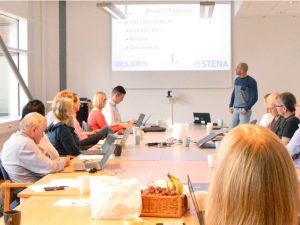How to tackle future requirements on vehicles?
The vehicle industry is undertaking a huge transformation. New requirements from customers and governments are pushing producers to meet the sustainable development goals in different ways. Producers of cars, trucks and agricultural machines are adjusting and investing in modern technologies where reductions of CO2 emissions is the primary goal, but what will happen beyond 2025 when the current EU regulation on fuel expires? What will be the important KPIs by then?

In November, Swedish Life Cycle Center gathered about 30 Swedish experts in vehicles and life cycle assessments to discuss the future and exchange knowledge. The working group LCA for vehicles has had several gatherings like this and on November 9 it was time to meet in Lindholmen Science Park, Gothenburg. Partners of Swedish Life Cycle Center as well as external actors were participating with the mission to look at present and future scenarios and to be prepared for future EU regulations.
In this fast-moving industry, companies need to be one step ahead of governmental regulations. Legislation takes time to implement and so does the development of new car and truck models, so in order to stay in the business, actors in the vehicle industry need a close collaboration with front-running research. Findings of today may affect regulations and policies tomorrow and in the meantime, car producers must start moving in the expected direction towards more sustainable production and circular approaches.
— The main idea with this working group is to gather many different actors working towards similar goals, but with different areas of expertise, Jenny Lagergren project manager for the group says.
— It is a good forum to discuss different topics, high and low together.
The full day in Gothenburg offered presentations from recent research and was altered with questions and intense discussions. It was a large breadth of presentations, from technology in agricultural machinery to strategies. The topics covered System design and technology choice, Comparison of LCA and EPD information, Models for LCA vehicles of today, Resource efficient recycling and second-use of batteries, Electric vehicles for a circular economy and Electromobility in Society. The speakers were reputable experts from Stena Recycling, SLU, Chalmers, IVL, Luleå University of Technology, Swedish Electromobility Center, RISE and Swedish Energy Agency.

As on most events arranged within the center, the workshop played a significant role. Three topics were discussed in groups and the argumentation was intense:
- What does the future model for LCA on vehicles look like? Tomorrow, when CO2 emissions will not be the most important KPI, the need for different types of models is obvious. Efficiency may be one important aspect as well as material composition and what type of components the models should include.
- To promote, compare and interpret LCA results using EPD. What will EPD models look like in the future when material use may gain importance? What kind of material data will be important in these future models?
- How do we meet future demands in the EU?
All groups discussed their common challenges and brought up smart strategies to reach the global goals of Agenda 2030.

— All-in-all it was a very appreciated meeting! There are few platforms like this one, where people with very different skills can meet and create knowledge together, Jenny Lagergren summarizes the day.
Short facts about the working goup
The working group LCA & vehicles was created in 2017, on the initiative of Swedish Energy Agency. Swedish Life Cycle Center is hosting the group within the project Swedish platform for the life cycle perspective and gathers around 45 people from academia, research institutes, industry and government agencies.
Notes from the discussions and presentations are confidential and available only for partners and invited guests:
Download presentations and notes
Read more about the group LCA and vehicles
Text: Ulrika Georgsson
Photo: Jenny Lagergren and Ulrika Georgsson

